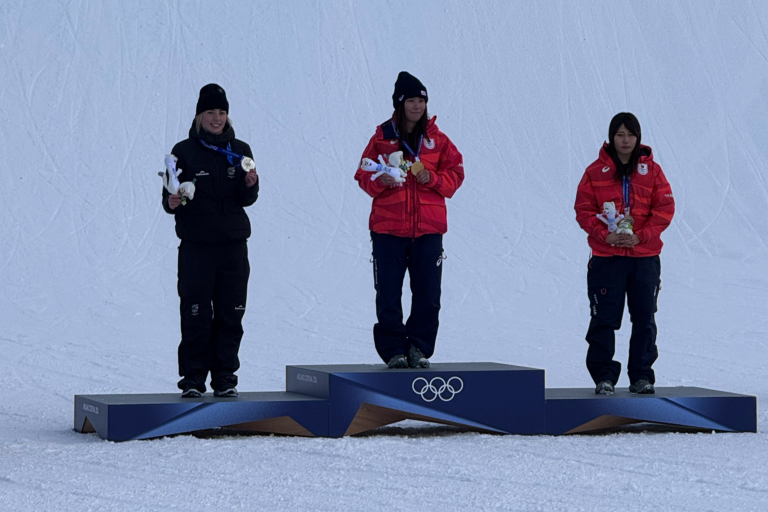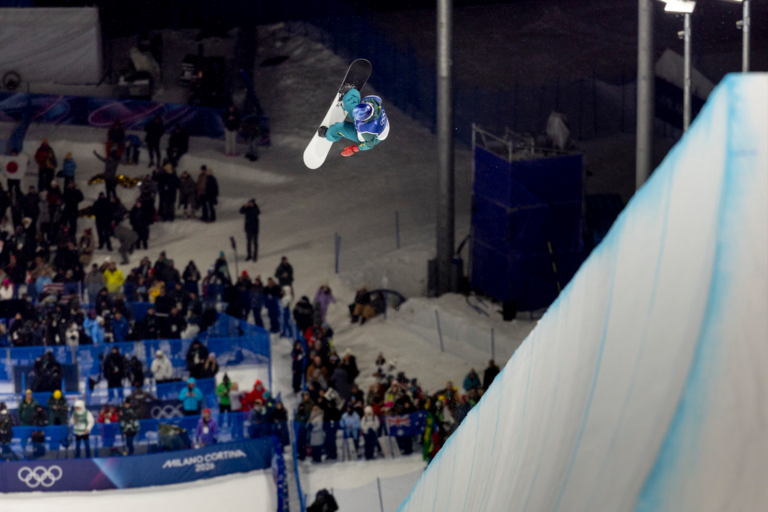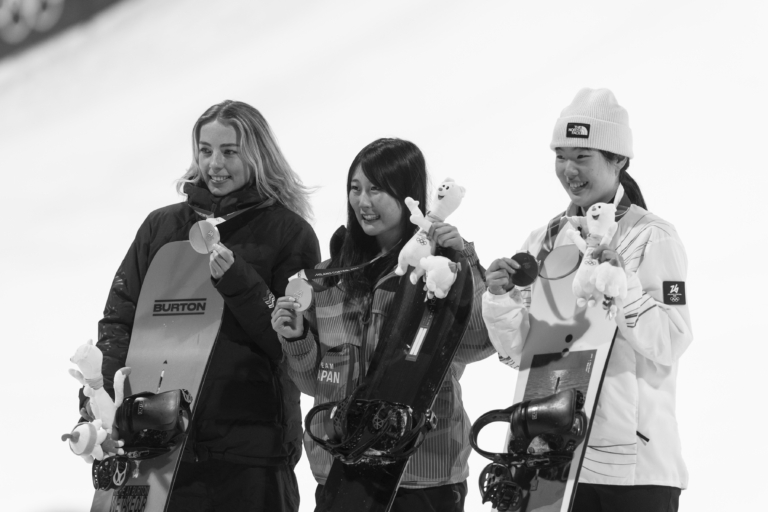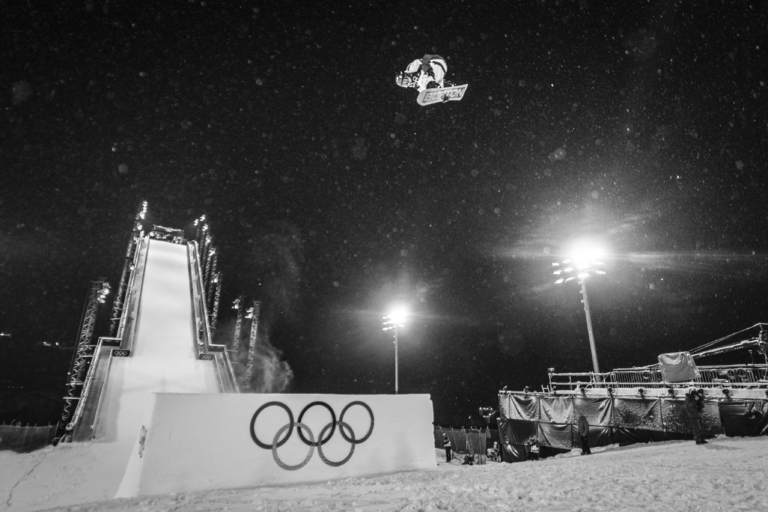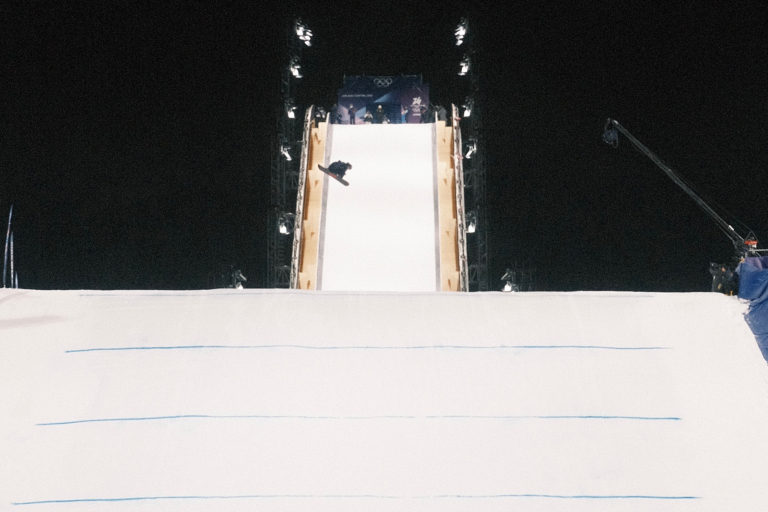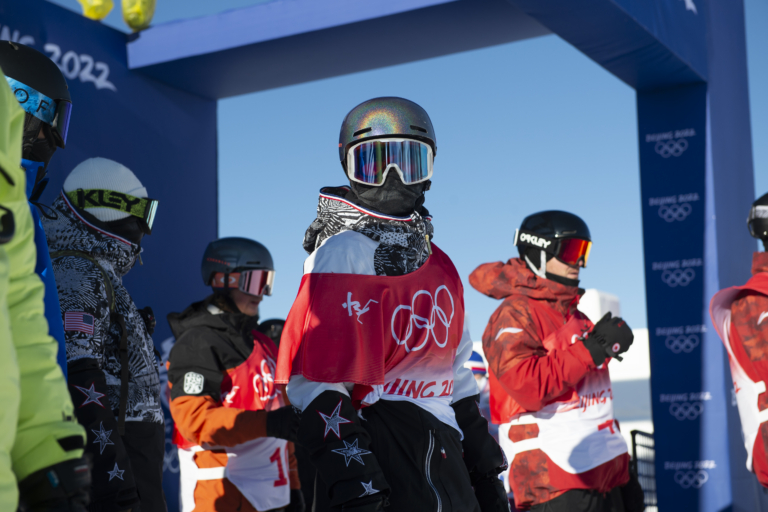“MAYBE I JUST LOVE IT TOO MUCH,” Kevin Jones says with more than a hint of nostalgia. “But I feel like I owe it to the snowboarding community to tell it how it is. I owe it to my friends now and gone. I owe it to myself to say what I really think.” Whatever Kevin Jones thinks, rest assured it’s not an opinion grounded in bullshit. From scumbag to superstar, KJ has landed more tricks, raged harder and made more money than most riders could ever handle. As far as snowboarding goes, the guy has done it all.
While much of the community simply remembers Kevin Jones as an X Games superstar, anybody who knows this sport’s evolution knows his contribution to be much deeper than that. Though the evidence of rock stardom against him is overwhelming — nine X Games medals, Transworld’s “Rider of the Year” three times, and an all-time catalog of video parts with Standard Films — his legacy is much more dynamic than a list of accolades.
Before Shaun White, Jones was snowboarding’s first superman. He was everything a snowboarder should be: talented, stylish, foolish… but mostly talented. From parks to powder to rails, Kevin ruled it all with authority. At the turn of the century, Kevin was the most popular snowboarder alive, both within the industry and in the mainstream. For a long time, Kevin lived a fantasy life.
Yet, there’s a side to him that is all too real; a side that ultimately took Kevin away from snowboarding and made him doubt all that he knew. He’s one of the most talented riders ever to strap in, but like the rest of us, Kevin turned out to be human.
If we can bring it way back to the early 2000s, let’s remember what an awkward little fucker snowboarding was. Snowboarding wasn’t so much finding its place among the nation’s youth, as it was being forced into some wack packaging for mass consumption.
 Growing up in the Sierra foothills outside of South Lake Tahoe, the young Kevin Jones first saw snowboarding in the early 90s. “I thought it was stupid with the neon green outfits and all that,” he says. “I thought they were trying to copy skateboarding but weren’t doing a very good job.” It wasn’t until he saw a couple local skaters doing it that he gave snowboarding any credit. “I was like, ‘man if those guys are into it, it must be pretty cool.’” Those guys were John Cardiel and Noah Salasnek, who Jones now says are two of his biggest heroes. “The next weekend I went up to Squaw Valley and tried it out. From there I never looked back.”
Growing up in the Sierra foothills outside of South Lake Tahoe, the young Kevin Jones first saw snowboarding in the early 90s. “I thought it was stupid with the neon green outfits and all that,” he says. “I thought they were trying to copy skateboarding but weren’t doing a very good job.” It wasn’t until he saw a couple local skaters doing it that he gave snowboarding any credit. “I was like, ‘man if those guys are into it, it must be pretty cool.’” Those guys were John Cardiel and Noah Salasnek, who Jones now says are two of his biggest heroes. “The next weekend I went up to Squaw Valley and tried it out. From there I never looked back.”
Kevin could never have imagined that 10 years down the road he would be the undisputed king of snowboarding, with a resume of unmatched commercial success and critical acclaim. By his mid 20s, his riding was as impressive as it was progressive. He was pioneering in the freestyle arena, exaggerating, embellishing and inventing tricks and trick combinations that were previously unheard of. Leading the freestyle movement of the late 1990s and early 2000s with equal parts skill and style, Kevin wasn’t just doing new tricks; he was making them look good. And it just so happened that this took place at a pivotal time, just as big companies were beginning to recognize that they could turn this snowboard thing into quarterly gains… if they could market it right.
With the arrival of the era of X Games and big money contests, snowboarding became more popular and so began a consumer-friendly dilution of the original product to the nation. Announcers misnamed tricks, judges awarded inferior riding and the media coined increasingly ridiculous nicknames — think floating red vegetable used to make ketchup.
Kevin acknowledges that he was a key ingredient in the growth of this scene, but his smug demeanor during interviews says what his funny, often nonsensical words don’t — that he was just pillaging this opportunity because he could. “I just did those contests to keep the sponsors happy. I’m not going to lie, the money was great too. Hundreds of thousands of dollars was a great paycheck, but nobody knew what they were doing or how to regulate the flow of things.”
He maintains that ‘Contest Kevin’ was just one aspect of ‘Snowboarder Kevin,’ whose main goal was riding everything and putting together video parts that showcased his whole repertoire. “My main driving focus was, ‘I can do better. I didn’t try hard enough this year.’ I wanted to be able to ride rails like JP. I would watch Jeremy Jones ride spines and I would see Jussi do a switch backside 9, and I would want to do all of these things so badly I put it on myself to make it happen. Basically I wanted to be able to do the best I could in any given snowboarding environment. It was an obsessive competition with myself.”
At the time, Kevin could not have foreseen the pressures his passion would ultimately impose on him, especially at a time when he was living the high life. “I never pictured myself a rock star, but money and fame and notoriety made me one. It was easy when I looked in the bank account and all I saw were a bunch of zeros behind a number to keep the party going.” Yet after more than a few years of living in hotels, traveling the world, becoming a celebrity and maintaining a level of dominance on his snowboard that was borderline bizarre, Kevin began to crack.
“I was on top of a line in Alaska with Dave Downing and I looked around and told him that I was done, I was over it. I went over and did a mellow line and that was it. I went home and called it quits. All I wanted was to be normal. At that point, of course, I didn’t know what would happen, I just knew that I wanted to be home.” Kevin put a cease and desist order on all things snowboarding and started to plot out the rest of his life.
“I definitely had a false sense of who I was, and I didn’t know who was controlling me. I let my sponsors control me for a good three years in the prime of my snowboarding career,” he says with some regret. “Those golden years I should have done what I wanted. Instead I had become a falsified illusion of what snowboarding really was.”
What struck Jones the hardest was that in the midst of his whirlwind stardom and so-called professionalism, he wasn’t giving attention to the important things in life. “After a while you need to embrace your family and friends. I had some life to catch up on.”
“I went fishing a lot, skateboarded a ton, on powder days I would go up to Bachelor with Josh Dirksen and snowboard, but there were no cameras involved, no production, it was the way it used to be, it was great.”
Intent on living the post-pro dream, Kevin moved to Bend, Oregon far from the scene of Mammoth and Tahoe, far from the grasp of Southern California, and settled into the quiet life.
“Right around that time, I got married as well. In life you make plans, you know, and I told myself when I was 30 years old, that would be it for my snowboarding career. I was going to have the white picket fence and live happily ever after.”
It seemed Kevin was creating all of the things he had neglected for so long, a life with some substance, a life with family and most importantly some self- satisfaction absent of the critical eye that had been hovering over him for so many years. He had a fly fishing business and appeared to be doing all of the things he felt were lacking while he was snowboarding professionally. But the uncompromising hand of fate kept things interesting for Mr. Jones.
“What I have learned is when I try and control life or make plans, life then steps in and says, ‘well, no we’re going to change that plan a little bit,’” he says. “So a few years later I got divorced and I started looking at life totally differently, again.”
“I didn’t realize it for a while because I was fighting it so hard, but it became very clear what was missing in my life. I was unhappy and the reason why became inescapable.”
During Kevin’s time away from professional snowboarding, he was unconsciously building up anger towards it. The taste of that life turned sour. “I was holding onto resentment toward people, toward snowboarding and toward myself. I was becoming bitter about all of it.”
Beneath the happy-go-lucky attitude Kevin projects, years of hard partying and denial had led him down some dark roads. Today he’s not one to shy away from the subject. “My drinking filled a void for many years. I used to drink at the things that needed attention instead of addressing them head on. I know snowboarding, and I know a good chunk of people in snowboarding are at the same place I was or will be there soon, so I don’t mind saying something about it if it might help someone out.
“I knew that shit was going to destroy me, so I made a decision to change all of that. It hasn’t always worked out perfectly, but I see things through different eyes now. Life is more forgiving. Everything that is important is just very clear to me now.
“Plus I have always been a very striking looking man but now I can say I look really good.”
If there’s one thing Kevin has, it’s a sense of humor. When Kevin is on, he’s on. Half Energizer Bunny, half talking parrot, if Kevin thinks something is humorous, he’ll repeat it for hours, days and weeks on end. By default this makes whatever he says funny as hell because it’s just so damn stupid to hear something one hundred different times in one hundred different accents… even if is just one word, or the name of his fake band, or a goat punching technique. Not the most subtle comedic style, but an effective one nonetheless.
Kevin admits he didn’t really have a calculated plan of attack for returning to professional snowboarding. “All I knew is that I was really missing everything that’s involved with actually going riding and all of the camaraderie in snowboarding at this level. You get chills. You miss the excitement of the whole production.” He was beginning to realize that at the root of it all, snowboarding is a rewarding way to spend your life.
Last year Kevin lived in Jackson Hole and filmed with the Bluebird crew, even if the conditions were beat. “It was just a miserable year for snow, but that didn’t stop us from going out and making the best of what it was. Those guys are awesome; they truly just want to have a good time above all else.”
Filming again with Standard came a bit later that year. “When you don’t do something for a long time, of course you are going to have your doubts about what you are capable of.” Yet as Kevin’s undeniable talent and self- motivating ways would prove, he did in fact have it. “After a while I realized that I could still snowboard, and as that confidence began to build, I decided that I at least wanted to try to get back to that level.”
For now Kevin seems content to just let snowboarding happen, instead of forcing it. “For the most part, my snowboarding experience over the past two years has been with my own money. Billabong has been very supportive as well, but in the end, the only one I am answering to is me, and I kind of like it that way.”
Still, Kevin has yet to reconcile with everything in snowboarding. He feels many areas are lacking, while much of the resources that could help the sport are being directed towards the excess of commercialism.
“Snowboarding doesn’t take care of their elders at all. I mean, where’s Noah Salasnek? That guy inspired what much of snowboarding is today.” For someone whom Kevin regards as his “total one hundred percent role model,” the sense of frustration that Kevin has is almost palpable. “That guy should be snowboarding every day, and us as snowboarders should be contributing to that fund. We should put in a dollar for each day we ride towards him. The Salastax.”
Kevin’s argument makes wonder about how these companies use riders up and then just recycle them when they can no longer perform to the industry standard. It is the nature of the industry that our billboards are living, breathing people, and when either their skill, or most notably their image, is no longer a viable means of promotion, they are finished. Fresh fruit for rotting vegetables – it’s the business model of snowboard marketing.
“But as us snowboarders get older, we are seeing that model doesn’t fly,” Kevin remarks. “I think that people are starting to see value in supporting YES and Jones and Compatriot, just because all of the people involved with those companies have been through it, and we all have something to say about it.”
The more Jones gets more involved with this notion, the more fired up he gets. “What’s directing this?” he exclaims. “The media? The industry? Who’s making the call on what snowboarding is?” he wonders. “Who’s giving the creative direction to snowboarding? Is the guy that lays out the next advertisement a surfer who goes up to Mammoth maybe once a year?”
Sadly, more times than not real snowboarders are not dictating what snowboarding is to the mainstream. This is much more than one man’s opinion. As a community how can we say something that resonates with people? How we support the idea of snowboarding rather than the Olympic sport?
“Snowboarding isn’t about how radical you get in the halfpipe, it’s about a life that you create,” Jones says with conviction. “To see that compromised for coolness and money is pretty upsetting.”
“I don’t think these things are going to show themselves right away but in time maybe something will emerge. The fact that I can even come back and snowboard again shows something. When I can piss all my sponsors off and they still take me back… there is something to be said there.”
Though Kevin doesn’t see anything wrong with actual snowboarding these days, it’s not to say he understands it all either. “For me the mountains have always been what snowboarding is about. So for me, if you don’t do everything then I guess you don’t get my full respect as a snowboarder. Maybe I just see it funny. I guess I get too involved with how I look at it sometimes, but maybe it’s because I just love it too much.”
His advice? “Don’t be afraid to ride everything. It’s so much more rewarding in the end and it will in turn open so many more doors. Instead of talking shit on the guys riding Alaska, go up there and see what that adventure is like. For guys that talk shit on handrails, go see how gnarly it is to catch your edge on a frontside boardslide and hit you head on the stairs.”
“Think about when you started riding. It didn’t matter what the conditions were or what board you were riding or that your hat matched your pants. It was about snowboarding what was in front of you… and that was enough.”
Curley Beyond how everything plays out in the media or in the mainstream, Kevin understands that this is about him and what he loves – something that can never be taken away. “In the end, this is just what I do. It’s all encompassing. It’s my friends, and that’s everything to me. It’s this thing I am going to do the rest of my life. I am a snowboarder. For better or worse, that’s what I am.”
When asked what he is most proud of, Kevin stops, looks away and simply says, “I am most proud of my outlook,” before continuing, “all of the awards and X Games medals were a way to keep the sponsors happy and though there is a part of me that is proud of that, what I really enjoy is the fact that I can see it for what it is.”
Something about that can’t help but resonate in the community, and when Kevin claims his biggest thrill these days comes from guys like Mark Carter and Travis Rice wanting to ride with him, he even gets a bit choked up. “When those guys want to take me out with them, I feel honored. When random people come up to me and say, ‘It’s so good to see a board in your hand’, I can’t help but feel good about that.”
I think if Kevin were to slip quietly into a mountain town like Jackson and just ride powder with his friends, he would be okay with that too, regardless of how his snowboarding is perceived by everyone else. However unlikely that may be, KJ, for better or worse, has left an indelible mark on snowboarding.
“I am talking about things that I have done and the life that I have lived, and it’s very contradictory, but this is what I have learned and what I have seen. People go through real life and they have real struggles and to have something like snowboarding is just a gift we need to embrace.”
With a final sigh he says, “I’m just trying to make some sense between my ears of this life I created.”
